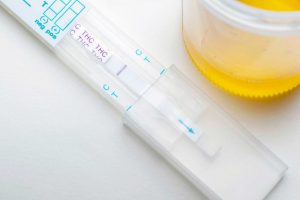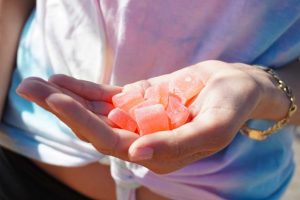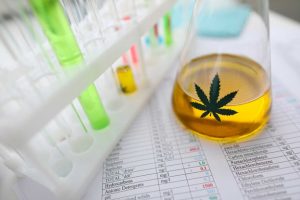By Medical Cannabis Program Interim Chair Eloise Theisen, NP, AGPCNP-BC
There is an increase of Delta-8 THC products hitting the market and consumers are curious about the new emerging cannabinoid. In recent months, nurses have gotten a lot of questions about Delta-8, which is sold in many states. Though Delta-8 is made from hemp, its effects are very similar to Delta-9 found in cannabis. Both Delta-8 and Delta-9 are forms of tetrahydrocannabinol (THC), which has an intoxicating effect, though the effects of Delta-8 are said to be less intense.
Hemp CBD companies have been adding this cannabinoid to their menus, offering it as a new option. Even though Delta-8 THC is readily available, quality education around this cannabinoid is missing. Consumers are confused, with questions like:
- What is Delta-8?
- Will Delta-8 get me high?
- Will Delta-8 help manage health conditions?
- Is Delta-8 legal?
- Will Delta-8 cause me to fail a drug test?
- How do I safely use Delta-8?
What is Delta-8?

In order to get the larger amounts of Delta-8 THC found in vapes, gummies and tinctures, CBD is converted to an isolate. From there, a solvent is added to liquify the isolate and an acid reagent is added to create a chemical reaction that produces the Delta-8 THC.
How are Delta-8 products tested for potency and safety?
Testing for Delta-8 THC in products and people is another gray area. There is no limit on how much Delta-8 a product can contain. However, in order to comply with the 2018 Farm Bill, these products must also meet federal hemp guidelines with less than 0.3% of Delta-9 THC (the other THC found in larger amounts in marijuana) at dry weight to be compliant.
When looking at companies who are selling Delta-8 THC, be sure to choose ones that provide a certificate of analysis (COA). Without a COA, it is hard to know how much THC or other cannabinoids may be in the product. The COA is the best way to verify the claims made on the company website.
Will Delta-8 get you high?

We know that Delta-8 THC interacts with our endocannabinoid system (attaches to the CB1 and CB2 receptors just like Delta-9), and research suggests that it is about two-thirds as potent as Delta-9 THC.
It is likely that consuming Delta-8 THC will produce similar euphoric and impairing effects to Delta-9 THC. Consumers may also experience dizziness, drowsiness, increased appetite, feelings of relaxation, dry eyes and dry mouth.
Is Delta-8 good for pain, inflammation, insomnia or other concerns?

With limited data, it is difficult to draw conclusions as to whether Delta-8 THC is effective at treating pain, inflammation, appetite and nausea and vomiting. Yet we see claims all over the internet promoting Delta-8 THC for a variety of conditions. The truth is the evidence is not there to support most of these claims.
Are you interested in becoming a holistic nursing professional?
Visit the links below to explore our holistic nursing programs:
Is Delta-8 legal in your state?

Delta-8 THC is being sold under the 2018 Farm Bill which legalized hemp. Whether or not this is legal is still a bit of a gray area. The Farm Bill does not allow for synthetic cannabinoids and the current process for the majority of Delta-8 THC on the market goes through a synthetic process converting CBD to Delta-8 THC. Additionally, the Drug Enforcement Agency (DEA) stated in an Interim Final Rule, that synthetically derived substances are a schedule I drug.
It is important to know your state laws on cannabis and hemp. Some states have started to enact legislation banning Delta-8 THC. Here is a map of states that have banned Delta-8 THC, as of May 21, 2021:
Source: Greenway, The Missouri Cannabis Magazine
Will Delta-8 show up on a drug test?

Some of these websites state that all forms of THC can be detected in a urine drug screen and it doesn’t matter whether it is Delta-9 or Delta-8. However, there is no science to validate this claim. It gets even more complicated when you consider that most Delta-8 THC products are synthetic. Synthetic cannabinoids are not likely to be detected in a urine drug screen.
At this time, it is difficult to say with certainty whether current drug panels will detect Delta-8 THC in the urine. There is a chance that the product may contain levels of Delta-9 THC that would be detected in a urine drug screen. Until we know more about testing for Delta-8 THC, it is important to err on the side of caution and avoid consuming cannabinoids if you cannot afford to fail a drug screen.
How to use Delta-8 products

Consumer interest and use has outpaced education and research once again. While it appears that Delta-8 THC is similar to Delta-9 THC, there are still a lot of unknowns with regard to side effects, dosing and clinical applications.
For those who are curious and want to explore Delta-8 THC, be sure to look for products that are lab tested and always start low and go slow when increasing your dose.
- We suggest starting with a dose between 2mg and 5mg of Delta-8 THC.
- You may need to split a single gummy into several pieces or only use a small amount of a tincture to get a low dose.
- Remember that cannabinoids taken by mouth may take between 30 minutes and 3 hours before you feel any effects. One of new consumers’ biggest mistakes is thinking that the Delta-8 is not working and ingesting more, before the original dose had time to take effect. This can result in you feeling more intoxicated than desired.
- While Delta-8 and Delta-9 are similar, they are not the same, and many consumers report different effects from each. Even if you’re an old pro with cannabis products containing Delta-9, we suggest starting low with Delta-8 so that you can get a sense of how your body reacts to the cannabinoid.
Article Sources
- https://www.projectcbd.org/politics/delta-8-thc-controversy
- https://www.leafreport.com/education/delta-8-thc-products-market-report-11339
- https://www.radiclehealthcare.com/post/understanding-delta-8-thc
- https://www.radiclehealthcare.com/post/understanding-delta-8-thc
- https://doi.org/10.1002/cpt1973143353
- https://www.congress.gov/bill/115th-congress/house-bill/2/text
- https://harrisbricken.com/cannalawblog/is-delta-8-thc-a-controlled-substance-yes-no-maybe/
- https://mogreenway.com/2021/05/11/delta-8-legality-map/
- https://www.redwoodtoxicology.com/docs/services/3370_sc_faq.pdf
Featured Posts:
- 11 Ways Healthcare Providers Use CBD to Improve Health & Wellness
- Ministry of Hemp Podcast Features Faculty Member Eloise Theisen – “A Nurse That Prescribes Cannabis: Treating Hemp As Medicine”
- Medical Cannabis Education and Practice
- Cannabis in Healthcare: What Clinicians Must Know
- Cannabis Patient Care Interviews Eloise Theisen, Medical Cannabis Faculty Member, on Stigma and Chronic Pain

